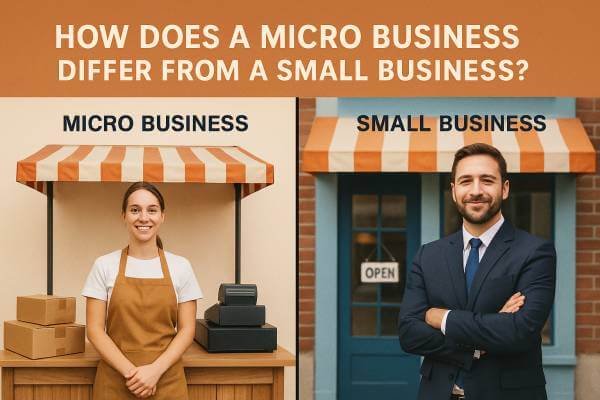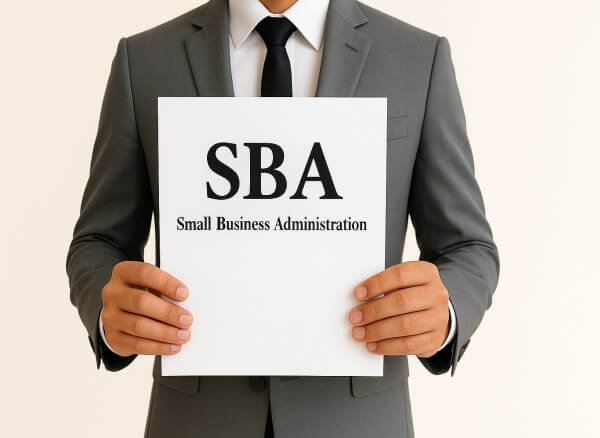Is freelancing considered a small business?
Are my freelancing activities considered a small business? That is the question that comes to mind if you’re working for yourself, setting your own rates, and landing clients on your terms. Your freelance business classification is more important than you think.
Many freelancers mistakenly believe they are simply “self-employed” and disregard this distinction. But here’s the thing: freelancing often qualifies as a small business, even if you’re working solo from your laptop.
Knowing whether you’re considered self-employed or a small business affects your taxes, legal responsibilities, and the benefits you might be missing out on, like small business loans or deductions.
In this article, we’ll clear up the difference between being self-employed vs. running a small business, explain how freelancers are typically classified, and walk you through what it means for your future. If you’re freelancing, you’re already a business owner; it’s just time to treat it that way.
Are Freelancers Considered Business Owners?
If you’re a freelancer, you’re not just doing gigs or picking up side work; you’re running a business. You might not have a storefront or employees, but if you’re making money by offering a service, you’re operating as a business owner whether you realize it or not.
Most freelancers automatically qualify as sole proprietors. That means you’re self-employed and personally responsible for your business income, expenses, and taxes. The IRS views freelancing as a business without the need to form an LLC or register a company.
Is freelancing considered a business? Absolutely. From a legal and tax perspective, you’re providing services for a fee, setting your terms, and managing your workflow, and that’s regarded as business ownership.
Whether you’re designing logos, writing content, managing social media, or offering tech support, your freelance setup is likely considered a micro business or a small business, depending on your income and whether you expand.
How the SBA Defines a Small Business
Before we delve into the specifics of freelance work, let’s take a moment to review the SBA’s definition of a small business. The SBA uses what it calls size standards to decide who qualifies for its programs. Understanding these small business criteria aids in determining if your freelance operation meets the eligibility requirements.
Here’s the quick rundown:
- Independently owned and operated: You run the show. There is no parent company making the decisions.
- For-profit: You’re in business to make money, not to run a charity.
- Not dominant in your field: In other words, you’re not the largest player in your niche.
- Meet size standards
• Employee count: Most industries cap out at 500 employees.
• Revenue: Depending on your NAICS code, limits can range anywhere from a few million up to around 41.5 million dollars in average annual receipts.
Where do freelancers belong?
If you operate independently or with a single contractor, you significantly fall below the employee threshold. Your income also probably sits well below those revenue caps. Therefore, even if your freelance business is just you and your laptop, it probably qualifies as a small business under SBA regulations.
Understanding this classification can lead to various benefits, such as SBA microloans, tax deductions, and increased credibility when approaching larger clients.
How Freelance Business Classification is Viewed Legally
When it comes to freelance business classification, most freelancers start out as sole proprietors. It’s the default setup in the U.S. the moment you start earning money on your own, and it doesn’t require any paperwork or formal registration.
But just because you’re a sole proprietor doesn’t mean you’re not running a business. In fact, your freelance work is legally treated like any other small business unless you choose to change your structure.
Here are the most common classifications for freelancers:
1. Sole Proprietorship
- No legal separation between you and your business
- Easiest to manage, but no personal liability protection
- All income gets reported on your personal taxes (Schedule C)
2. Single-Member LLC
- A step up in legal protection
- Keeps your personal assets separate from your business
- Still simple to manage, with tax flexibility
3. S-Corporation (or LLC taxed as S-Corp)
- Ideal for freelancers earning higher income
- Allows you to pay yourself a salary and potentially lower self-employment taxes
- Requires more paperwork and accounting
Choosing the right business structure impacts more than just your taxes. It also influences the perceptions of banks, clients, and government agencies. An LLC, for example, can help you appear more professional and protect your personal assets in case something goes wrong.
Your freelance classification starts simple, but it can grow and shift as your business evolves.
Self-Employed vs. Small Business: What’s the Difference?
This is where things get a little confusing for many freelancers. You’ve probably heard both terms, self-employed and small business owner, but aren’t sure which one applies to you. The truth is, you can be both at the same time.
Self-Employed
This is a tax status. If you work for yourself and don’t have an employer taking taxes out of your paycheck, the IRS considers you self-employed. You’ll typically file taxes using Schedule C and pay self-employment tax (which covers Social Security and Medicare).
Small Business Owner
This refers to how your work is structured and recognized. If you run a for-profit business that’s independently operated and falls under the SBA’s size standards, then you’re technically a small business owner, even if you’re self-employed.
Here’s how it breaks down:
| Role | What it means | Example |
| Self-Employed | You work for yourself and report income as an individual | Freelance writer submitting 1099s |
| Small Business Owner | You operate a business that qualifies under SBA rules | Freelancer with an LLC or established client base |
So if you’re freelancing full-time, invoicing clients, tracking expenses, and managing your workload, you’re not just self-employed. You’re also running a small business.
Do Freelancers Qualify for Small Business Resources?
Simply working independently does not exclude you from accessing small business resources. You can still access small business resources. As a freelancer, you may qualify for many of the same resources and benefits designed for small business owners. You just need to know what to ask for and where to apply.
SBA Loans and Microloans
The Small Business Administration (SBA) offers microloans, typically up to $50,000, for businesses with smaller funding needs. These are ideal for freelancers who need help with equipment, marketing, or even short-term cash flow. You’ll need a basic business plan and some documentation, but it’s totally doable.
Tax Deductions
Freelancers can write off a ton of expenses, including:
- Home office costs
- Software subscriptions
- Marketing tools
- Travel and client meals
- Phone and internet bills
These fall under standard small business tax deductions, and they can seriously reduce what you owe at tax time.
Business Grants
Some grants are open to self-employed individuals and freelancers, especially those offered locally or by nonprofit groups. If your freelance work supports a specific community, demographic, or industry, you may be eligible for freelancer-friendly funding.
Health Insurance Options
Freelancers may be able to access small business health plans if they form an LLC or hire even one part-time employee. You can also explore professional associations that offer discounted group insurance.
Training and Support
Organizations like SCORE, SBDCs, and Women’s Business Centers offer free business coaching, marketing help, and startup resources. They serve all kinds of small businesses, including solo freelancers.
If you’re freelancing full-time or even part-time, you’re not left out. You just have to treat your freelance work like the business it is.
When Should You Register as a Small Business?
If you’re freelancing casually, you might not need to register your business right away. But once things pick up, with more clients, bigger projects, or steady income. It’s smart to think about making it official.
Here are a few signs it might be time to register your freelance business:
1. You’re earning consistent income: If freelancing is more than a one-off gig and you’re making steady money, registering gives your business structure and legitimacy.
2. You want to protect your personal assets: As a sole proprietor, there’s no legal line between your personal and business finances. Forming an LLC gives you limited liability, which means your personal property is safer if something goes wrong.
3. Clients start asking for business paperwork: Some companies prefer working with registered businesses. Having an EIN, a business bank account, or an LLC makes you look more professional and trustworthy.
3. You’re planning to grow: If you want to expand your services, hire help, or apply for business credit or funding, having a registered business helps a lot.
How to register:
- Choose a name for your business
- Decide on your structure (Sole Proprietor, LLC, etc.)
- Register with your state or local government
- Apply for an EIN (Employer Identification Number) if needed
- Open a business bank account
Contrary to popular belief, the process is straightforward and provides access to a multitude of opportunities. It also helps with taxes, bookkeeping, and branding.
Conclusion
Your freelancing activities are considered a small business. Whether you’re designing logos, writing code, or consulting from your home office, you’re not just self-employed; you’re running a real business. The key is understanding your freelance business classification, knowing your legal status, and taking advantage of the benefits available to you.
You don’t need a huge team or a physical office to qualify as a small business. What matters is that you’re offering a service, earning income independently, and operating with the mindset of a business owner.
If you haven’t already, consider taking the next step:
- Register your business
- Look into small business tax deductions
- Explore funding options
- Tap into free resources for growth and support
Freelancers make up a powerful part of the small business world, and it’s time we start treating ourselves like the business owners we are. Are you prepared to expand your business? Start by getting clear on where your freelance business stands and where you want it to go next.
Frequently Asked Questions
- Is freelancing considered a small business?
Yes. In most cases, freelancing qualifies as a small business, especially if you’re earning income independently and operating for profit. You’re likely classified as a sole proprietor or micro business, depending on your structure and revenue.
- What is the freelance business classification?
Most freelancers are automatically classified as sole proprietors, but they can also register as an LLC or even an S-Corp depending on their needs. Your classification affects how you’re taxed, your legal protection, and your access to small business resources.
- What’s the difference between self-employed and small business owners?
Self-employed refers to your tax status, while small business owner refers to your role in running an independent, for-profit business. Freelancers are often both.
- Do freelancers qualify for small business loans or grants?
Yes. Freelancers may qualify for SBA microloans, local grants, and even federal funding, especially if they register their business officially and meet basic requirements like being for-profit and operating in the U.S.
- Do I need to register my freelance business?
Not always, but registering can offer benefits like legal protection, credibility, and easier access to funding or insurance. If you’re earning steady income or want to grow, forming an LLC or getting a business license might be a smart move.










